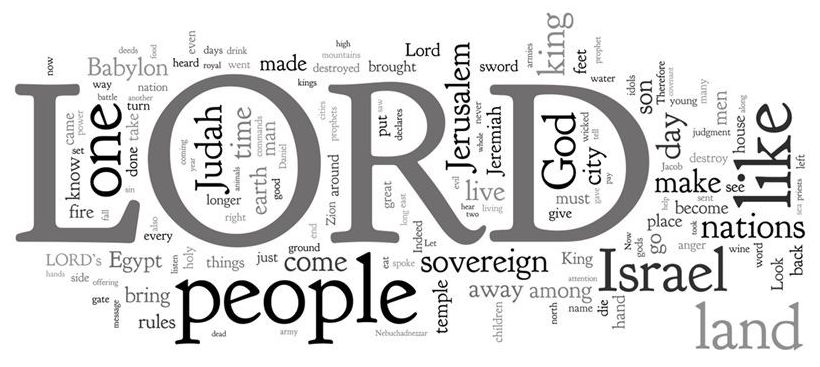Session Five - Major and Minor Prophets (1) - Judgement and Exile
Introduction
The terms Major Prophets and Minor Prophets are simply a way to divide the Old Testament prophetic books. The Major Prophets are Isaiah, Jeremiah, Lamentations, Ezekiel, and Daniel. The Minor Prophets (sometimes called "the Twelve") are Hosea, Joel, Amos, Obadiah, Jonah, Micah, Nahum, Habakkuk, Zephaniah, Haggai, Zechariah, and Malachi (the last three came after the return of the Jewish remnant from exile).
The Major Prophets are described as "major" because their books are longer, and the content has broad, even global implications. If the text required more than one scroll, the writer was a "major" prophet. If it was limited to one scroll, they were considered a "minor" prophet. The usage of "major" and "minor" had nothing to do with the quality of thoughts or actions of the prophets, or even how often they prophesied. It is simply a matter of God choosing to reveal more to the Major Prophets (OR inspire the retention of more of their prophecies) than He did to the Minor Prophets.
The Prophets are among the least popular books of the Bible for Christians to read. They often employ unusual language, and are seemingly full of warnings and condemnations against sin in the nations of Israel and Judah. Nevertheless, there is much valuable content to be studied in the Major and Minor Prophets. We read of Christ's birth in Isaiah and Micah. We learn of Christ's atoning sacrifice in Isaiah. We read of Christ's return in Ezekiel, Daniel, and Zechariah. We learn of God's holiness, wrath, grace, and mercy in all of the Major and Minor Prophets. And much more. Some of the insights and prophecies were for the time of the prophets themselves. Some followed in a generation or two. Some related to the coming of Jesus Christ, the Messiah. And some remain in the future.
God intended for the Israelites to live according to His commandments and to show His truth to all the world (Gen 12:1-3). However, time and again, they lost sight of their mission and lapsed into idolatry, sin, hubris, or narrow-minded nationalism. On such occasions, God raised up prophets, such as Samuel, Elijah, Jeremiah, Isaiah and others, to lead them back to the right path. The Old Testament writings make no attempt to hide the fact that the Israelites and their leaders had many failings and flaws. Their ongoing rebellion against God eventually led to the kingdom dividing into two separate (and competing) nations, and to their downfall.
What Was the Role of Old Testament Prophets?
In the Old Testament the office of a prophet was someone called to speak on God's behalf to His people. Moses, Deborah and Nathan are referred to as prophets; sometimes prophets' names were not recorded (eg 1 Sam 2:27, 1 Ki 20:12, 13, 28). The prophets had a tough assignment. While they had privilege of sharing the amazing news of redemption and restoration, it usually wasn't until after they laid down the coming judgment of God. They often arose during times of national crisis and called the people back to their covenant with God. Their calls for repentance (which included strong warnings to kings and other authorities) didn't usually fall onto listening ears or teachable hearts, and bad marriages, nightmares and tears often plagued them. They predicted (though this was not always the case) and warned, eg about the Assyrian takeover, the destruction of their own people brought on by idolatry, and the Babylonian captivity. They sometimes received visions, but more often spoke because God called them and gave them His messages. The Bible is usually silent on how the messages came. Sometimes the prophecies had multiple meanings, relating to present and future events.
The prophets proclaimed that God had spoken through them. They considered themselves His messengers and heralds, for they repeatedly preface their messages with the phrases such as, "This is what the Lord says". Peter explains that the prophets "were carried along by the Holy Spirit" (2 Pet. 1:21). Just as God used Moses to write and preach so that Israel could know God's will in his day, so God used the prophets in the times in which they lived. The prophets declared God's instructions in two main ways: words and symbols. They usually did so orally (eg Jer. 7:1-8:3) or in written form (eg Jer. 36:1-32). Occasionally they performed symbolic acts that demonstrated God's purposes. For example, Isaiah went naked and barefoot for three years to teach God's people their future if they continued to seek help from other nations rather than from Him (Isa. 20:1-6). Perhaps the saddest case of symbolic prophecy was Hosea's marriage to unfaithful Gomer, which portrayed God's relationship with unfaithful Israel (Hosea 1-3).
Historical Overview
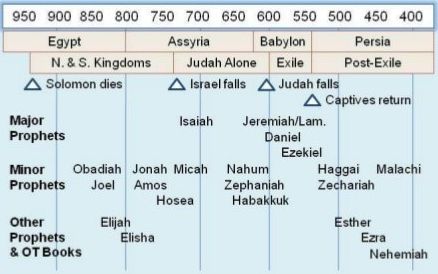
Timeline of the Main OT Prophets
David's son Solomon reigned in Jerusalem after David's death. During the reign of Solomon's son, civil war broke out, and the kingdom was divided: the northern kingdom was called Israel, and the southern kingdom was called Judah. The Davidic dynasty ruled in Judah (1 Kings 2:1; 12).
The Fall of Israel
The kingdom of Israel had an unbroken series of wicked kings. None of them sought the Lord or attempted to lead the nation according to God's Law. God sent prophets to warn them, including Elijah and Elisha, but the kings (the worst of whom was Ahab, with his wife Jezebel) persisted in their wickedness. Amos and Hosea, were called to challenge the kings of Israel from Jeroboam II through Hoshea. Because the kings and people alike refused to return to God, in 722 BC He allowed the powerful empire of Assyria to overthrow Israel. The Assyrians, cruel and merciless, not only destroyed the cities and towns of the land, taking its wealth as booty, but they also took the people captive and dispersed them throughout the empire in an attempt to destroy forever all sense of nationhood (2 Ki. 17:1-23). That was the end of the northern kingdom (1 Kings 17:1; 2 Kings 2; 17), usually referred to as Israel, but sometimes collectively called Ephraim, after the tribe of Ephraim.
When the Assyrians were in power they became a fierce and conquering kingdom. Around 900 BC they began to conquer territories throughout the Middle Eastern and Mesopotamian region. They dominated kingdoms and empires such as Egypt and the Hittites. By 740 BC the Assyrians were used by God to judge Israel for their sins.
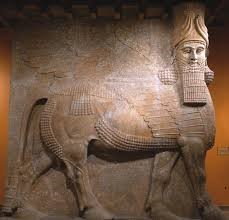
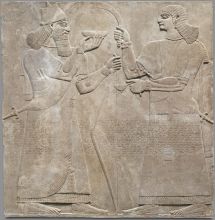
Assyria
The Assyrians populated Israel with mixes of people from other nations they had defeated. 2 Ki 17:24 says, "And the king of Assyria brought people from Babylon, Cuthah, Avva, Hamath, and Sepharvaim, and placed them in the cities of Samaria instead of the people of Israel. And they took possession of Samaria and lived in its cities." The descendants of these foreigners and the remnant of Israel were later simply called "Samaritans.
During the time of Christ, the Samaritans were despised as an "unclean" people because of their mixed ancestry and rejection of temple-based worship.
The book of Jonah does not take place in Israel, and the text gives no indication of its date. God gave Jonah a mission and a message to Nineveh, the Assyrian capital, calling the Assyrian people to repentance. Jonah ran from the call (a prophet of Israel would not want the nation's arch-enemy to be a recipient of God's mercy and forgiveness). After being swallowed by a big fish and miraculously restored Jonah went on to bring God's word to Assyria (albeit still reluctantly); they repented and were spared.
The books of 2 Chronicles and 2 Kings deal with much of the time leading up to fall of both the Northern Kingdom (Israel) and Judah. They also cover the destruction of Jerusalem by Nebuchadnezzar and the beginning of the Babylonian captivity.
The Fall of Judah
Like Israel, the kingdom of Judah had its share of wicked kings, but the chain was broken by an occasional godly king who truly loved God and sought to govern according to the Law. The nation was preserved during the Assyrian invasion and endured other threats. During this time, the prophet Isaiah preached against the sins of Judah and foresaw a Babylonian invasion. Isaiah also predicted the coming of the Servant of the Lord - He would suffer for the sins of His people and be glorified and sit on David's throne. The prophet Micah predicted that the Promised One would be born in Bethlehem (Isaiah 37; 53:5; Micah 5:2).
As Israel neared its destruction, the people of Judah wavered between the worship of God and the worship of foreign gods. Good kings pulled the people back from idol worship and bad business and social practices, but bad kings reversed that. Obadiah and Joel prophesied under kings Jehoram, Ahaziah, Joash, and Queen Athaliah.
Isaiah spoke for God in Judah under four kings—Uzziah, Jotham, Ahaz, and Hezekiah - with Micah also prophesying during that period. Hezekiah was followed on the throne by Manasseh, of whom Scripture records that he did more evil in the sight of the Lord than all his predecessors (2 Kgs. 21:2-16), however he eventually repented and restored true worship in the land. Manasseh was followed by good king Josiah who instituted a thorough cleansing of the temple, ridding it of much pagan worship. People cleaning the temple found an ancient scroll that spelled judgment on the land, which led to repentance by the king and people and the last revival of worship of Jehovah in Judah.
The prophets in Jerusalem at this time included Nahum, Jeremiah and Zephaniah (though the high priest also turned to a prophetess named Huldah). Josiah was followed by kings whose disastrous political decisions eventually brought the Babylonian conqueror Nebuchadnezzar II against Jerusalem (2 Ki 23:31-24:17).
As the Babylonian Empire spread throughout the Middle East, around 607 BC, King Jehoiakim of Judah was forced into submission, becoming a vassal to Nebuchadnezzar (2 Kings 24:1). In 605 BC, Nebuchadnezzar took 10,000 Jews into exile in Babylon, including Daniel, Hananiah (Shadrach), Mishael (Meshach) and Azariah (Abednego). The prophet Ezekiel was among those captives. Habakkuk joined Jeramiah and Zephaniah, continuing their prophetic work in Jerusalem.
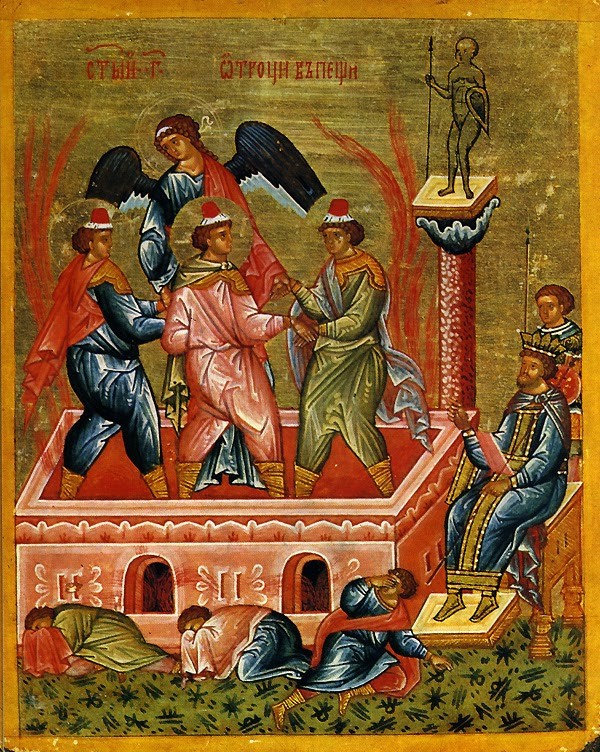
Mediaeval Jewish depiction of Shadrach, Meshach and Abednego
After three years of serving Nebuchadnezzar, Jehoiakim of Judah rebelled against Babylonian rule and once again turned to Egypt for support. After sending his army to deal with Judah's revolt, Nebuchadnezzar himself left Babylon in 598 BC to deal with the problem. Arriving in Jerusalem around March of 597 BC, his armies laid siege to Jerusalem, taking control of the area, looting it, and taking captive with him Jehoiakim's son, Jehoiachin, his family, and almost all of the population of Judah, leaving only the poorest people of the land (2 Kings 24:8-16). Nebuchadnezzar appointed King Zedekiah to rule as his representative over Judah. There were actually several different times during this period (607-586 BC) when the Jews were taken captive by Babylon.
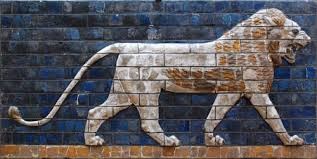
Babylon
Encouraged by false prophets and ignoring Jeremiah's warnings, Zedekiah eventually decided to join a military coalition that was being formed by Edom, Moab, Ammon and Phoenicia in rebellion against Nebuchadnezzar (Jeremiah 27:1-3). In 589, Nebuchadnezzar laid siege to Jerusalem for more than two years (2 Ki 24:18-25:21; 2 Chr. 36). The city capitulated in 586, mainly because of famine, and was razed to the ground with its temple and palaces totally destroyed. Zedekiah was taken captive to Babylon after seeing his sons killed before him and then having his eyes plucked out (2 Kings 25). Jerusalem was laid to waste, the temple was destroyed, and all the houses were burned. The majority of the people were taken captive, but, again, Nebuchadnezzar left a remnant of poor people to serve as farmers and vinedressers (2 Kings 25:12).
The prophet Jeremiah experienced the fall of Jerusalem and predicted that the Jewish captives in Babylon would return to the Promised Land after 70 years. Jeremiah also prophesied a future covenant in which the Law was not written on tablets of stone but in the hearts of God's people. This new covenant would result in forgiveness of their sins (2 Kings 25:8-10; Jeremiah 29:10; 31:31-34). Jeremiah remained in Jerusalem, continuing his prophetic work among the impoverished remnant in Judah, until he was taken off to Egypt. Meanwhile, Ezekiel continued to prophesy in Babylon to the exiled Jews living there.
Among the Jewish captives in the first deportation from Judah (605 BC) was the young man Daniel, whom God used in Babylon in the court of the emperors. When Babylon was overthrown by the Persians in 539 BC, the new Medo-Persian king Cyrus allowed the Jews to return to Judah and rebuild their city and its temple, first under Governor Zerubbabel and then under Governor Nehemiah. Their work, in the context of the return, will be covered next week. Daniel's prophecies span the Babylonian exile (Dan. 1:1) through Cyrus's decree ending the exile (Dan. 10:1). He also predicted the coming of the Messiah (Daniel 2:36-45; 9:26).
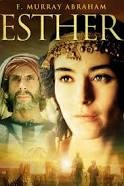
1999 Hollywood depiction of Queen Esther
Esther
The events in the book of Esther occurred from 483 BC to 473 BC, during the first half of the reign of the Persian King Xerxes (also named Ahasuerus), who chose Esther as his queen. The Book of Esther is about a Jewish girl, adopted by her uncle Mordecai after her parents had died. Xerxes had rejected his other wife (Queen Vashti) and married Esther after a beauty contest, not knowing she was Jewish. Meanwhile, Haman, the king's prime minister, created a grudge against Esther's uncle Mordecai and devised a law intended to kill all of the Jews in the kingdom. Esther found out the plot by Mordecai and managed to stop it. Esther is the only book in the Bible not to mention the name of God, but that is not to say that God was absent; His plan and presence permeate the story. God is at work, even when He is behind the scenes. Esther is a reminder that God's plan for His people will be fulfilled.
The festival of Purim (on the 14th of Adar, the day after the Jews emerged victorious against Haman), is still celebrated by Jews in honour of Esther's story.
Summaries of the Major and Minor Prophets (in the order in which they appear in our Bibles)
Isaiah (66 chapters)
Isaiah son of Amoz is often thought of as the greatest of the OT prophets. His name means "The Lord saves." Isaiah unveils the full dimensions of God's judgment and salvation. Isaiah provides us with the most comprehensive prophetic picture of Jesus Christ in the entire Old Testament. It includes the announcement of His coming (Isaiah 40:3-5), His virgin birth (7:14), His proclamation of the good news (61:1), His sacrificial death (52:13-53:12), and His return to claim His own (60:2-3).
Jeremiah (52 chapters)
This book preserves an account of the ministry of Jeremiah, whose call, personal life and struggles are shown to us in greater depth than those of any other Old Testament prophet. His ministry began in 627 BC and ended around 582 BC with his prophecy to the Jews who fled to Egypt (Jeremiah 44:1). For most of this time, Jeremiah based his ministry in of Jerusalem. The kingdom of Judah fell during Jeremiah's ministry (586 BC), having been threatened for many years by outside powers—first Assyria and Egypt and then by their eventual conquerors, Babylon.
Lamentations (5 chapters)
Lamentations (of Jeremiah) consists of a series of poetic and powerful "laments" over the destruction of Jerusalem in 586 BC
Ezekiel (48 chapters)
The Old Testament in general and the prophets in particular presuppose and teach God's sovereignty over all creation and the course of history. Nowhere in the Bible are God's initiative and control expressed more clearly and pervasively than in the book of Ezekiel.
Daniel (12 chapters)
Daniel captures the major events in the life of the prophet Daniel during Israel's exile. His life and visions point to God's plans of redemption and sovereign control of history. The book of Daniel is full of symbolism, both for his own time and future events.
Hosea (14 chapters)
The prophet Hosea son of Beeri lived in the tragic final days of the northern kingdom. His life and relationships served as a parable of God's faithfulness to an unfaithful Israel.
Joel (3 chapters)
The prophet Joel warned the people of Judah about God's coming judgment - and the coming restoration and blessing that will come through repentance. Joel prophesied the pouring out of the Holy Spirit that started on the Day of Pentecost.
Amos (9 chapters)
Amos prophesied during the reigns of King Uzziah over Judah (792-740 BC) and Jeroboam II over Israel (793-753).
Obadiah (1 chapter)
Obadiah warned the people of Edom about judgment coming upon them.
Jonah (4 chapters)
This short book is a narrative account of Jonah's mission to the city of Nineveh, his initial resistance, his imprisonment in a great fish, his visit to the city, and the subsequent outcome. Unlike the other prophets, Jonah's is a missionary story.
Micah (7 chapters)
Micah prophesied sometime between 750 and 686 BC during the reigns of Jotham, Ahaz, and Hezekiah, kings of Judah. Israel was in an apostate condition. Micah predicted the fall of her capital, Samaria, and also foretold the inevitable desolation of Judah.
Nahum (3 chapters)
The book contains the "vision of Nahum," whose name means "comfort." The focal point of the entire book is the Lord's judgment on Nineveh for her oppression, cruelty, idolatry, and wickedness.
Habakkuk (3 chapters)
Little is known about Habakkuk except that he was a contemporary of Jeremiah and a man of great faith. The book with his name contains a discussion between the prophet and God concerning injustice and suffering.
Zephaniah (3 chapters)
The prophet Zephaniah was a person of considerable social standing in Judah and was probably related to the royal line. The intent of the author was to announce to Judah God's approaching judgment.
Some Messianic Prophecies
Biblical scholar, Alfred Edersheim, concluded that there at least 456 passages in the Old Testament that Jewish Rabbis historically have interpreted as being about the Messiah. Here is a sample, from the prophets:
| Prophecies About Christ from the Old Testament Prophets | Old Testament Scripture | New Testament Fulfillment |
|---|
| Would be born in Bethlehem. | Micah 5:2 | Matthew 2:1
Luke 2:4-6 |
| Born of a virgin. | Isaiah 7:14 | Matthew 1:22-23
Luke 1:26-31 |
| Heir to King David's throne. | 2 Samuel 7:12-13
Isaiah 9:7 | Luke 1:32-33
Romans 1:3 |
| Messiah's throne will be anointed and eternal. | Psalm 45:6-7
Daniel 2:44 | Luke 1:33
Hebrews 1:8-12 |
| Would be called Immanuel. | Isaiah 7:14 | Matthew 1:23 |
| Messiah would spend a season in Egypt. | Hosea 11:1 | Matthew 2:14-15 |
| A massacre of children would happen at his birthplace. | Jeremiah 31:15 | Matthew 2:16-18 |
| A messenger would prepare the way for his coming. | Isaiah 40:3-5 | Luke 3:3-6 |
| Would be rejected by his own people. | Psalm 69:8
Isaiah 53:3 | John 1:11
John 7:5 |
| Would be preceded by Elijah. | Malachi 4:5-6 | Matthew 11:13-14 |
| Would be called a Nazarene. | Isaiah 11:1 | Matthew 2:23 |
| Would bring light to Galilee. | Isaiah 9:1-2 | Matthew 4:13-16 |
| Would speak in parables. | Psalm 78:2-4
Isaiah 6:9-10 | Matthew 13:10-15, 34-35 |
| Would be sent to heal the brokenhearted. | Isaiah 61:1-2 | Luke 4:18-19 |
| Would be called King. | Psalm 2:6
Zechariah 9:9 | Matthew 27:37
Mark 11:7-11 |
| Would be betrayed. | Psalm 41:9
Zechariah 11:12-13 | Luke 22:47-48
Matthew 26:14-16 |
| The price for his betrayal Messiah's price money would be used to buy a potter's field. | Zechariah 11:12-13 | Matthew 27:9-10 |
| Would be silent before his accusers. | Isaiah 53:7 | Mark 15:4-5 |
| Would be spat upon and struck. | Isaiah 50:6 | Matthew 26:67 |
| Would be crucified with criminals. | Isaiah 53:12 | Matthew 27:38
Mark 15:27-28 |
| His hands and feet would be pierced. | Psalm 22:16
Zechariah 12:10 | John 20:25-27 |
| Soldiers would pierce His side. | Zechariah 12:10 | John 19:34 |
| He would be buried with the rich. | Isaiah 53:9 | Matthew 27:57-60 |
| He would be a sacrifice for sin. | Isaiah 53:5-12 | Romans 5:6-8 |
For Reflection
Isaiah 61:1-3
The Spirit of the Sovereign LORD is on me, because the LORD has anointed me to proclaim good news to the poor. He has sent me to bind up the brokenhearted, to proclaim freedom for the captives and release from darkness for the prisoners, to proclaim the year of the LORD's favor and the day of vengeance of our God, to comfort all who mourn, and provide for those who grieve in Zion - to bestow on them a crown of beauty instead of ashes, the oil of joy instead of mourning, and a garment of praise instead of a spirit of despair. They will be called oaks of righteousness, a planting of the LORD for the display of his splendour.
Jeremiah 9:23, 24
This is what the LORD says: "Don't let the wise boast in their wisdom, or the powerful boast in their power, or the rich boast in their riches. But those who wish to boast should boast in this alone: that they truly know me and understand that I am the LORD who demonstrates unfailing love and who brings justice and righteousness to the earth, and that I delight in these things. I, the LORD, have spoken!
Jeremiah 29:11-13
"For I know the plans I have for you," says the Lord. "They are plans for good and not for disaster, to give you a future and a hope. In those days when you pray, I will listen. If you look for me wholeheartedly, you will find me."
Lamentations 3:22-24
The faithful love of the LORD never ends! His mercies never cease. Great is his faithfulness; his mercies begin afresh each morning. I say to myself, "The LORD is my inheritance; therefore, I will hope in him!"
Esther 4:14
A challenge for each of us, "who knows but that you have come to your (royal) position for such a time as this?"
Joel 2:28, 29
Then, after doing all those things, I will pour out my Spirit upon all people. Your sons and daughters will prophesy. Your old men will dream dreams, and your young men will see visions. In those days I will pour out my Spirit even on servants—men and women alike.
Micah 6:8
The LORD has told you what is good, and this is what he requires of you: to do what is right, to love mercy, and to walk humbly with your God.
Zephaniah 3:17
For the LORD your God is living among you. He is a mighty savior. He will take delight in you with gladness. With his love, he will calm all your fears. He will rejoice over you with joyful songs.
Habakkuk 2:4
But the righteous will live by their faithfulness to God.
Habakkuk 3:17-19
Even though the fig trees have no blossoms, and there are no grapes on the vines; even though the olive crop fails, and the fields lie empty and barren; even though the flocks die in the fields, and the cattle barns are empty, yet I will rejoice in the LORD! I will be joyful in the God of my salvation! The Sovereign LORD is my strength!
